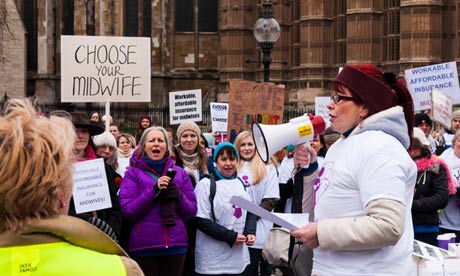
In February 2009 I gave birth to my second child at home. I had no idea as I feasted on post-partum pancakes (not made of placenta) and wondered whether to fully carry out my birth plan ("martini after the birth"), that I was in the presence of an endangered species. Or that were I to do the same thing come October this year, a criminal offence would have taken place. I was attended, you see, by an independent midwife (IM).
An IM is a fully qualified, often hugely experienced midwife who may have worked for the NHS but now works for herself. She is self-employed and you pay for her services: for full care this is about £2,500, which may be payable in instalments. Women use an IM if they want to guarantee one-to-one care, have all of their antenatal visits at home or if they don't fancy arguing with their hospital for the birth of their choice.
That was my motivation. Over 40 and having previously had a caesarean section, I was classed as high risk. Like many women who seek out IMs, I wanted to be looked at as an individual case, not via the one-size-fits-all NHS policy. I wanted to keep my options open, not to have to fight for them.
But from October 2013 all of this will change when a new EU directive comes into force. The problem is insurance. Currently, IMs operate without indemnity insurance and have done so for years. NHS midwives are covered by their employers. If something goes wrong and an IM has been negligent, your option is to sue the midwife – and she risks losing her home.
The new directive will make it illegal for any health professional to practise without insurance. Most have employers, but those who are self-employed, like IMs, will be left in no man's land.
IMs can't get insurance because no one will underwrite them. Not because they are any riskier than any other midwife, but because all of the data ever presented to insurance companies doesn't separate out midwifery care, let alone IM care; it lumps all maternity negligence together including obstetric (often the riskiest) led care and the premiums, if they could be found, would be prohibitive.
All of the independent midwives I spoke to say that they wanted to be insured but can't find insurance. The government, despite David Cameron calling IMs "the gold standard", seems alarmingly ignorant of the predicament IMs are in, or the impact of their potential demise. Some of them have dealt with the natural twin or breech births that an increasingly cautious NHS tends to avoid. There is a consultation paper on the new legislation that anyone can comment on before 17 May and a petition to help secure affordable commercial insurance for IMs at epetitions.direct.gov.uk.
Without insurance, from October IMs will be outlawed and unemployed. If one attends a woman in labour she risks prosecution. IMs fear that women who are too scared to go via the NHS will be forced to give birth alone.
Although there are currently about 170 IMs in the UK, the women they attend amounts to a few thousand. That includes women such as me, who had a transformative birth experience the second time around. The knock-on effects of a positive birth experience cannot be underestimated.
But it doesn't matter because we have plenty of NHS midwives, right? Not quite. In January, the Royal College of Midwives (RCM) released a statement about the "massive shortage" of midwives and how maternity services were at a "tipping point".
There are currently 2,500 new midwifery student places in England every year, and they are over subscribed. The popularity of the BBC drama Call the Midwife has caused a surge of interest in studying midwifery. "There are absolutely masses of people wanting to be midwives, the numbers are crazy," says Cathy Warwick, chief executive of the RCM. But there aren't the jobs for them all once they qualify. "We're 5,000 midwives short in England," says Warwick. "And we don't have the jobs for them to go to. There isn't the funding." Newly qualified midwives are waiting for people in posts to either die or retire. "It's a dead man's shoes situation," says Warwick.
It's a woman's right to have the birth she wants, isn't it? Although a woman does have the right to give birth at home, and an NHS midwife has a legal duty of care to attend her, hospitals can tell women that they don't support their choice of birth. This can be justified by there not being enough midwives to attend a home birth, for instance, or that the birth pool in the hospital is not free. None of this produces the calm confidence a woman needs to have a positive birth experience, which may be the reason why one in five women do not feel supported by the NHS during their pregnancy and birth, according to research published by the RCM.
Last month, a hospital in Ireland applied for a court order to carry out a caesarean section on a woman who was refusing to have the surgery. She was overdue (as both of my babies were) and as she had had a prior caesarean section, she wanted to try for a vaginal birth. In the end, the woman gave in and consented before she was forced to.
Without an independent midwife's support, that woman could have been me. One day, it could be any of our daughters.
To comment on the consultation paper visit: bit.ly/10MSSEq
To sign the petition visit: bit.ly/VSAXhm

